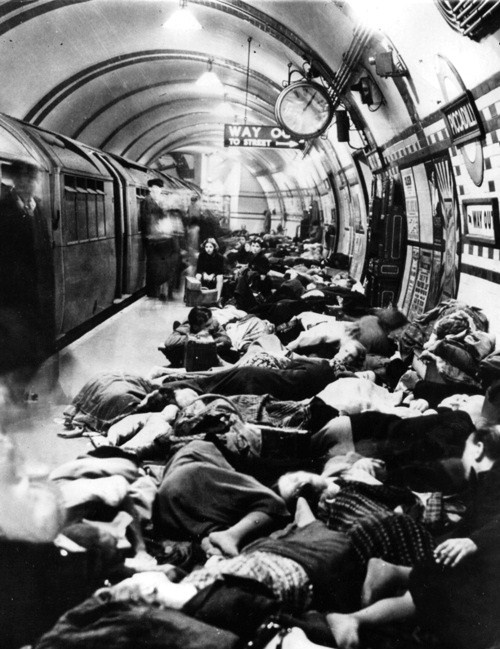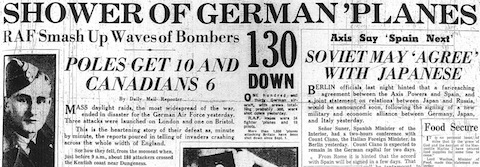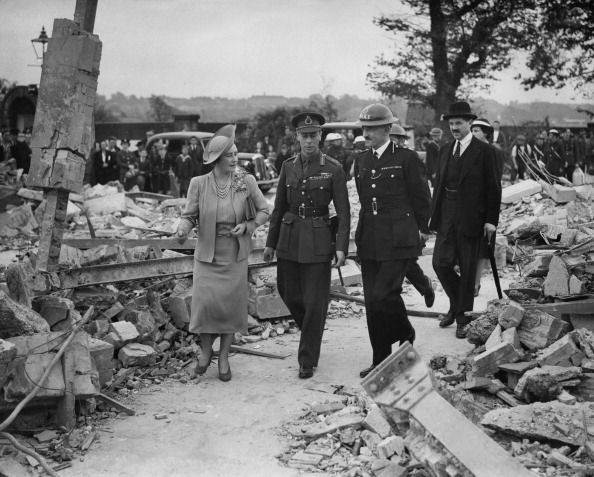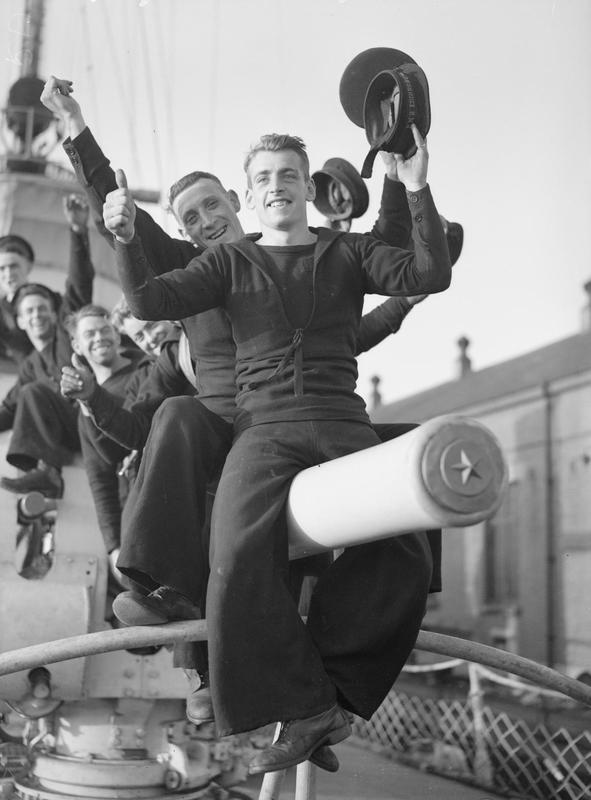Saturday 28 September 1940
 |
| Piccadilly Underground Station, 28 September 1940. |
Thus, the new Luftwaffe strategy is to launch smaller, more focused formations which will force the RAF to pick and choose among them for attacks. Another tactic is to keep the escorting Bf 109s even higher than usual to retain the height advantage.
The first raid comes across at about 10:00 when 120 aircraft approach the Kent coast. They separate into two waves, one toward London and the other around Maidstone. About six of the bombers make it to central London, while the others drop out along the way to bomb RAF Biggin Hill, Poplar, Deptford, and Woolwich.
The second raid comes across right on schedule after lunchtime, at about 14:30. It heads for Portland, Beachy Head, Maidstone and nearby areas. RAF Nos. 10 and 11 Groups basically thwart this raid, but at some cost to themselves. Numerous Luftwaffe fighter pilots claim victories in this action, despite the lack of bombing success.
A third attack wave crosses toward Kent about half an hour after the second. It heads from Cherbourg toward Portsmouth and Tangmere. Fighter Command is stretched by this raid, which dilutes the effort against the second wave. Most of the bombers turn back to base after dropping their bombs in the water.
The Luftwaffe mounts a couple of small convoy raids during the remainder of the afternoon, with limited success (described below).
After dark, London, as usual, is the main target. The bombers also attack airfields throughout England, including at Digby, the Midlands, Liverpool, Derby, Nottingham, Peterborough and around Bristol. A Liverpool raid causes heavy damage, with the bombers circling around over Wales to escape. A large force of 120 bombers attacks London shortly after 21:00, and the attacks last until after sunrise. London anti-aircraft fires all night long until the morning sun arrives. The night is noted for damage to hospitals in West Middlesex Heston, Staines Emergency, St Bernards (Uxbridge) and Barnes Isolation.
 |
| At a London railway station, an evacuee has a little fun. 28 September 1940. |
Major Werner Mölders of Stab/JG 51 downs a Spitfire over Littlestone for his forty-second, staying ahead of Adolf Galland for the fierce battle for top scorer. Hptm. Helmut Wick of Stab I./JG 2 and Hptm. Walter Oesau of Stab III./JG 51 file for their victories, thirty-second victory, and thirty-first, respectively.
Hans-Joachim Marseille notches his seventh victory while over the English Channel (a Spitfire). His plane is damaged in the encounter, but he makes it back to a French beach.
The high victory scores for the Luftwaffe Experten are encouraging for the Luftwaffe, but also signs of possible trouble down the road. It is a case of the rich getting richer while the vast majority of pilots play second fiddle. New aces need to be developed in order to continue this kind of production, as the few top aces are accumulating an exaggerated amount of experience and confidence while their subordinates - often forced to play supportive roles to the "masters" - languish.
Hans-Joachim Marseille proves the point by being the exception, as he refuses to play second fiddle and thus gains experience, stature, and victories, but at the cost of resentment by his superiors. Around this time, in fact, Marseille is passed over promotion from Fähnrich, leaving him the only one in his entire Geschwader (LG 2).
 |
| Daily Mail, 28 September 1940. |
The British lose a Hampden bomber near Bergen to Uffz. Otto Niemeyer of 4./JG 77 (his fourth victory).
Today's Daily Mail has an article quoting "a famous neutral air expert" deriding the Luftwaffe's chances in the Battle of Britain. He makes the following points:
- The Luftwaffe's numerical advantage is not as big as believed;
- Many of the Luftwaffe's bombers are dive-bombers which are not effective in a strategic bombing campaign;
- The Luftwaffe's ability to expand is minimal, while the RAF's ability to do so is "immense";
- The Luftwaffe has few aircrew reserves;
- The Luftwaffe training system is completely inadequate.
 |
| King George VI and Queen Elizabeth inspecting air-raid damage in London during the Blitz, 27 September 1940. By Keystone/Hulton. |
U-37 (Kplt. Victor Oehrn), just starting her eighth patrol, spots abandoned freighter Corrientes, torpedoed by U-32 on the 26th. It finishes the freighter off.
The Luftwaffe attacks Convoy HX 73A north of Aberdeen in the North Sea. It bombs and sinks 5193-ton British freighter Dalveen. There are 32 survivors and 11 men perish. In addition, they damage British freighter Queen City.
British 344 ton trawler HMS Recoil hits a mine and sinks off Bridport, Dorset on the English Channel. All 24-25 men aboard perish. Since nobody survived, it is merely a guess that it hit a mine on or about this date (some accounts place this on the 27th, but nobody knows for sure). The Recoil previously had been a German trawler named Blankenburg and was seized in April near Norway.
The RAF bombs and sinks 517 ton German (Dutch) tanker Shell II during a raid on the Scheldt estuary. Casualties are unknown.
A flotilla of German destroyers (Eckholdt, Riedel, Lody, Galster, Ihn, and Steinbrinck) based at Brest makes an audacious night-time visit to Falmouth Bay and lays mines. This proves to be a very successful minefield near the Royal Navy base at Plymouth.
The first tranche of new British destroyers obtained from the US Navy pursuant to the destroyers-for-bases deal arrives in Great Britain.
The Bismarck departs from Kiel for Gotenhafen (Gdynia, Poland) to conduct sea trials.
Convoy OA 221 departs from Methil, Convoy FN 293 departs from Southend, Convoy OL 5 departs from Liverpool,
U-97 (Kapitänleutnant Udo Heilmann) is commissioned.
 |
| Hans-Joachim Marseille's plane near Théville after engine failure. Bf 109 E-7; W.Nr. 4091. 28 September 1940. |
The Royal Navy fleet at Alexandria puts to sea to support a convoy to Malta pursuant to Operation MB 5. This convoy includes over 1000 troops and anti-aircraft artillery for Malta. The force is led by battleships Warspite and Valiant. An Italian submarine operating off Sidi Barrani spots the armada and reports it to the Regia Marina, which immediately dispatches the Italian fleet, led by battleships Littorio, Veneto, Cavour and Cesare, from Taranto and Messina.
Australian destroyer HMAS Stuart, at sea to cover the Malta Convoy MB 5, works with Alexandria aircraft to sink Italian submarine Gondar along the Egyptian coast. The Gondar carried three human torpedoes for use against the British fleet at Alexandria. All 47 crew are survivors, including four frogmen to man the human torpedoes, and taken aboard the Stuart.
Italian submarine Scire also is carrying manned torpedoes for use against the British fleet at Gibraltar but is recalled when the Italians learn that the fleet is down at Freetown following Operation Menace.
British submarine HMS Pandora torpedoes and sinks 813-ton Italian freighter Famiglia north of Ras Aamer, Libya (near Tobruk/Benghazi). Some accounts place this sinking in late August. Italian torpedo boat Enrico Cosenz tries to sink the Pandora in retaliation, but the British sub gets away.
Spanish 1,939 ton freighter Monte Moncayo hits a mine and sinks about 15 km from Cagliari, Sicily. There are four deaths.
Propaganda War: The British begin Radio Belgique, broadcasting from London to German-occupied Belgium. The Germans have been broadcasting all along every evening in the cultured tones of Lord Haw-Haw, so this is a counter-measure to provide the "real" news. Radio Belgique is produced with the support of the Belgian government in exile and forms part of the BBC's European Service.
Radio Belgique broadcasts in French and Dutch (two separate services), and thus also provides news for people in France who choose to listen. Broadcasts at first are in a single segment from 21:00 to 21:15 each evening with the language switching on alternate days. Later, the broadcasts are expanded to include both languages daily at alternate times, with an expanded slate of both morning and evening timeslots.
Radio Belgique is a continuation of the pre-war BELGA agency and transmits throughout the war. The Germans are a bit slow on the uptake and only ban people from listening to the broadcasts in December, with harsh penalties imposed upon those who do listen. The Germans respond with collaborationist radio stations and attempt to jam the transmissions. It is estimated that more Belgians listen to this BBC station than to the German-run stations. These BBC propaganda broadcasts start small and take time to acquire a loyal following, but eventually accumulate a massive audience. They have a direct influence on the war, being used to transmit codes to resistance groups and provide a way for people who oppose the occupation to link together through this shared interest.
US Government: US Under-Secretary of State Sumner Welles, who visited the European leaders during Spring 1940, notes in a written statement that the majority of US citizens wanted to support Great Britain against Germany. He notes the "heroism" of "that proud people" in "defending their homes."
British Homefront: All clocks are adjusted back one hour for Daylight Savings Time.
September 1940
September 1, 1940: RAF's Horrible Weekend
September 2, 1940: German Troopship Sunk
September 3, 1940: Destroyers for Bases
September 4, 1940: Enter Antonescu
September 5, 1940: Stukas Over Malta
September 6, 1940: The Luftwaffe Peaks
September 7, 1940: The Blitz Begins
September 8, 1940: Codeword Cromwell
September 9, 1940: Italians Attack Egypt
September 10, 1940: Hitler Postpones Sealion
September 11, 1940: British Confusion at Gibraltar
September 12, 1940: Warsaw Ghetto Approved
September 13, 1940: Zeros Attack!
September 14, 1940: The Draft Is Back
September 15, 1940: Battle of Britain Day
September 16, 1940: Italians Take Sidi Barrani
September 17, 1940: Sealion Kaputt
September 18, 1940: City of Benares Incident
September 19, 1940: Disperse the Barges
September 20, 1940: A Wolfpack Gathers
September 21, 1940: Wolfpack Strikes Convoy HX-72
September 22, 1940: Vietnam War Begins
September 23, 1940: Operation Menace Begins
September 24, 1940: Dakar Fights Back
September 25, 1940: Filton Raid
September 26, 1940: Axis Time
September 27, 1940: Graveney Marsh Battle
September 28, 1940: Radio Belgique Begins
September 29, 1940: Brocklesby Collision
September 30, 1940: Operation Lena
2020

No comments:
Post a Comment